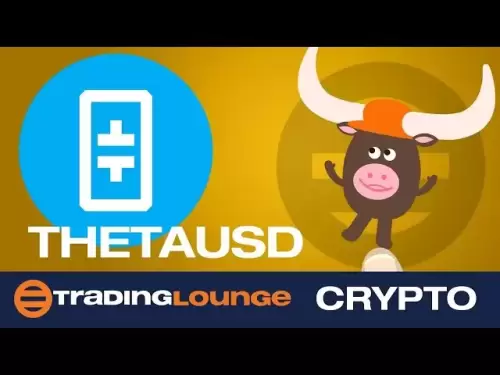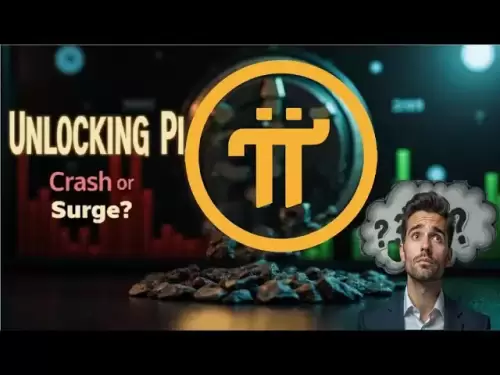-
 Bitcoin
Bitcoin $107,814.2183
1.08% -
 Ethereum
Ethereum $2,463.5660
1.32% -
 Tether USDt
Tether USDt $1.0006
0.02% -
 XRP
XRP $2.1904
0.02% -
 BNB
BNB $658.4950
1.31% -
 Solana
Solana $150.0570
1.53% -
 USDC
USDC $1.0002
0.01% -
 TRON
TRON $0.2823
1.22% -
 Dogecoin
Dogecoin $0.1634
2.68% -
 Cardano
Cardano $0.5657
3.30% -
 Hyperliquid
Hyperliquid $38.6646
-0.70% -
 Bitcoin Cash
Bitcoin Cash $501.8244
-2.85% -
 Sui
Sui $2.7979
3.64% -
 Chainlink
Chainlink $13.1942
1.21% -
 UNUS SED LEO
UNUS SED LEO $8.9470
0.44% -
 Avalanche
Avalanche $17.7386
2.23% -
 Stellar
Stellar $0.2324
-0.87% -
 Toncoin
Toncoin $2.8435
1.38% -
 Shiba Inu
Shiba Inu $0.0...01148
2.34% -
 Litecoin
Litecoin $85.6186
0.37% -
 Hedera
Hedera $0.1490
1.37% -
 Monero
Monero $322.8553
1.63% -
 Polkadot
Polkadot $3.3791
1.39% -
 Dai
Dai $1.0002
0.02% -
 Bitget Token
Bitget Token $4.5749
0.75% -
 Ethena USDe
Ethena USDe $1.0002
0.00% -
 Uniswap
Uniswap $7.1451
2.66% -
 Aave
Aave $268.4133
1.40% -
 Pepe
Pepe $0.0...09614
1.94% -
 Pi
Pi $0.4952
0.74%
Does BSV transaction require real-name authentication? Is anonymous trading feasible?
BSV transactions may require real-name authentication on centralized exchanges, but decentralized platforms like Bisq allow for anonymous trading without KYC.
May 03, 2025 at 03:14 pm

The question of whether BSV (Bitcoin SV) transactions require real-name authentication and whether anonymous trading is feasible is a complex one, deeply intertwined with the broader dynamics of cryptocurrency regulations and blockchain technology. Let's delve into these aspects to provide a comprehensive understanding.
Understanding BSV and Its Transaction Mechanism
BSV, or Bitcoin Satoshi Vision, is a cryptocurrency that emerged from a hard fork of Bitcoin Cash in 2018. It aims to fulfill the original vision of Bitcoin as described by Satoshi Nakamoto, focusing on scalability and stability. Transactions on the BSV network are recorded on a public ledger, which is transparent and immutable. However, the requirement for real-name authentication largely depends on the platform or exchange used for trading.
Real-Name Authentication on BSV Exchanges
When it comes to trading BSV on centralized exchanges, the requirement for real-name authentication can vary significantly. Many exchanges, especially those operating within jurisdictions with stringent financial regulations, require users to undergo a process known as Know Your Customer (KYC). This process involves submitting personal identification documents to verify the user's identity.
- For example, exchanges like Binance and Coinbase, which support BSV trading, mandate KYC procedures. Users must provide government-issued IDs, proof of address, and sometimes even a selfie to confirm their identity.
- On the other hand, some exchanges operating in regions with less stringent regulations might not enforce KYC, allowing users to trade without real-name authentication.
Anonymous Trading on Decentralized Platforms
Decentralized exchanges (DEXs) offer a different scenario for BSV trading. These platforms operate without a central authority, and many do not require users to go through KYC processes. This makes them a popular choice for those seeking anonymous trading.
- For instance, platforms like Bisq and LocalCryptos allow users to trade BSV directly with one another without the need for real-name authentication. Users can interact using pseudonyms, and transactions are processed through the BSV blockchain.
- However, it's important to note that while DEXs may not require real-name authentication, the transparency of the blockchain means that transaction details are still publicly visible. This can potentially compromise anonymity if not handled carefully.
Privacy Features in BSV Transactions
BSV itself does not inherently provide strong privacy features like some other cryptocurrencies, such as Monero or Zcash. Transactions on the BSV blockchain are pseudonymous, meaning that while real identities are not directly linked to transactions, the addresses involved are visible on the public ledger.
- To enhance privacy, users can employ techniques like using multiple addresses for different transactions or utilizing mixing services that obscure the trail of funds. However, these methods do not guarantee complete anonymity and come with their own set of risks and complexities.
Regulatory Considerations and Compliance
The feasibility of anonymous BSV trading is also influenced by regulatory environments. In some countries, regulations are tightening around cryptocurrency transactions, pushing for more transparency and accountability.
- For example, in regions like the European Union and the United States, there are ongoing efforts to combat money laundering and terrorist financing through cryptocurrencies. This has led to increased scrutiny of crypto exchanges and a push for more robust KYC and Anti-Money Laundering (AML) practices.
- In contrast, some jurisdictions have more relaxed regulations, allowing for a higher degree of anonymity in cryptocurrency trading. However, this can vary widely and is subject to change as global regulatory landscapes evolve.
Practical Steps for Anonymous BSV Trading
If you're interested in trading BSV anonymously, here are some practical steps you can take:
- Choose the Right Platform: Opt for decentralized exchanges like Bisq or LocalCryptos that do not require KYC.
- Use Privacy Tools: Employ tools like VPNs to mask your IP address and consider using Tor for additional privacy.
- Manage Your Wallets: Use different BSV addresses for different transactions to avoid linking them together. Consider using hardware wallets for added security.
- Avoid Centralized Points of Failure: Be cautious of using centralized services for any part of your trading process, as they may require KYC or be subject to regulatory oversight.
Frequently Asked Questions
Q: Can I trade BSV anonymously on all exchanges?
A: No, not all exchanges allow for anonymous trading. Centralized exchanges often require KYC, while decentralized exchanges are more likely to support anonymous trading.
Q: Are there any risks associated with anonymous BSV trading?
A: Yes, there are risks. These include potential legal repercussions in jurisdictions with strict regulations, as well as the risk of scams and fraud due to the lack of oversight on decentralized platforms.
Q: How can I enhance my privacy when trading BSV?
A: To enhance privacy, use multiple BSV addresses, consider mixing services, and trade on decentralized platforms. Additionally, using VPNs and Tor can help mask your online activity.
Q: Does BSV offer any built-in privacy features?
A: BSV transactions are pseudonymous but do not have built-in privacy features like those found in privacy-focused cryptocurrencies. Users must rely on external tools and practices to enhance their privacy.
Disclaimer:info@kdj.com
The information provided is not trading advice. kdj.com does not assume any responsibility for any investments made based on the information provided in this article. Cryptocurrencies are highly volatile and it is highly recommended that you invest with caution after thorough research!
If you believe that the content used on this website infringes your copyright, please contact us immediately (info@kdj.com) and we will delete it promptly.
- Robert Kiyosaki Still Bullish on Bitcoin: Why $107K is 'Cheap'
- 2025-07-02 20:30:12
- Coinbase, Liquifi, and Crypto M&A: What's the Deal?
- 2025-07-02 21:10:12
- XRP, SEC, and ETF Buzz: What's the Deal?
- 2025-07-02 22:10:11
- Nexo Drives into Crypto-Golf: A Digital Wealth Play on the DP World Tour
- 2025-07-02 21:10:12
- Crypto Down in July 2025? Decoding the Market's Mixed Signals
- 2025-07-02 21:30:12
- Arbitrum, DeFi, and TradFi: A New York Minute on the Future of Finance
- 2025-07-02 22:10:11
Related knowledge

How to customize USDT TRC20 mining fees? Flexible adjustment tutorial
Jun 13,2025 at 01:42am
Understanding USDT TRC20 Mining FeesMining fees on the TRON (TRC20) network are essential for processing transactions. Unlike Bitcoin or Ethereum, where miners directly validate transactions, TRON uses a delegated proof-of-stake (DPoS) mechanism. However, users still need to pay bandwidth and energy fees, which are collectively referred to as 'mining fe...

USDT TRC20 transaction is stuck? Solution summary
Jun 14,2025 at 11:15pm
Understanding USDT TRC20 TransactionsWhen users mention that a USDT TRC20 transaction is stuck, they typically refer to a situation where the transfer of Tether (USDT) on the TRON blockchain has not been confirmed for an extended period. This issue may arise due to various reasons such as network congestion, insufficient transaction fees, or wallet-rela...

How to cancel USDT TRC20 unconfirmed transactions? Operation guide
Jun 13,2025 at 11:01pm
Understanding USDT TRC20 Unconfirmed TransactionsWhen dealing with USDT TRC20 transactions, it’s crucial to understand what an unconfirmed transaction means. An unconfirmed transaction is one that has been broadcasted to the blockchain network but hasn’t yet been included in a block. This typically occurs due to low transaction fees or network congestio...

How to check USDT TRC20 balance? Introduction to multiple query methods
Jun 21,2025 at 02:42am
Understanding USDT TRC20 and Its ImportanceUSDT (Tether) is one of the most widely used stablecoins in the cryptocurrency market. It exists on multiple blockchain networks, including TRC20, which operates on the Tron (TRX) network. Checking your USDT TRC20 balance accurately is crucial for users who hold or transact with this asset. Whether you're sendi...

What to do if USDT TRC20 transfers are congested? Speed up trading skills
Jun 13,2025 at 09:56am
Understanding USDT TRC20 Transfer CongestionWhen transferring USDT TRC20, users may occasionally experience delays or congestion. This typically occurs due to network overload on the TRON blockchain, which hosts the TRC20 version of Tether. Unlike the ERC20 variant (which runs on Ethereum), TRC20 transactions are generally faster and cheaper, but during...

The relationship between USDT TRC20 and TRON chain: technical background analysis
Jun 12,2025 at 01:28pm
What is USDT TRC20?USDT TRC20 refers to the Tether (USDT) token issued on the TRON blockchain using the TRC-20 standard. Unlike the more commonly known ERC-20 version of USDT (which runs on Ethereum), the TRC-20 variant leverages the TRON network's infrastructure for faster and cheaper transactions. The emergence of this version came as part of Tether’s...

How to customize USDT TRC20 mining fees? Flexible adjustment tutorial
Jun 13,2025 at 01:42am
Understanding USDT TRC20 Mining FeesMining fees on the TRON (TRC20) network are essential for processing transactions. Unlike Bitcoin or Ethereum, where miners directly validate transactions, TRON uses a delegated proof-of-stake (DPoS) mechanism. However, users still need to pay bandwidth and energy fees, which are collectively referred to as 'mining fe...

USDT TRC20 transaction is stuck? Solution summary
Jun 14,2025 at 11:15pm
Understanding USDT TRC20 TransactionsWhen users mention that a USDT TRC20 transaction is stuck, they typically refer to a situation where the transfer of Tether (USDT) on the TRON blockchain has not been confirmed for an extended period. This issue may arise due to various reasons such as network congestion, insufficient transaction fees, or wallet-rela...

How to cancel USDT TRC20 unconfirmed transactions? Operation guide
Jun 13,2025 at 11:01pm
Understanding USDT TRC20 Unconfirmed TransactionsWhen dealing with USDT TRC20 transactions, it’s crucial to understand what an unconfirmed transaction means. An unconfirmed transaction is one that has been broadcasted to the blockchain network but hasn’t yet been included in a block. This typically occurs due to low transaction fees or network congestio...

How to check USDT TRC20 balance? Introduction to multiple query methods
Jun 21,2025 at 02:42am
Understanding USDT TRC20 and Its ImportanceUSDT (Tether) is one of the most widely used stablecoins in the cryptocurrency market. It exists on multiple blockchain networks, including TRC20, which operates on the Tron (TRX) network. Checking your USDT TRC20 balance accurately is crucial for users who hold or transact with this asset. Whether you're sendi...

What to do if USDT TRC20 transfers are congested? Speed up trading skills
Jun 13,2025 at 09:56am
Understanding USDT TRC20 Transfer CongestionWhen transferring USDT TRC20, users may occasionally experience delays or congestion. This typically occurs due to network overload on the TRON blockchain, which hosts the TRC20 version of Tether. Unlike the ERC20 variant (which runs on Ethereum), TRC20 transactions are generally faster and cheaper, but during...

The relationship between USDT TRC20 and TRON chain: technical background analysis
Jun 12,2025 at 01:28pm
What is USDT TRC20?USDT TRC20 refers to the Tether (USDT) token issued on the TRON blockchain using the TRC-20 standard. Unlike the more commonly known ERC-20 version of USDT (which runs on Ethereum), the TRC-20 variant leverages the TRON network's infrastructure for faster and cheaper transactions. The emergence of this version came as part of Tether’s...
See all articles

























































































